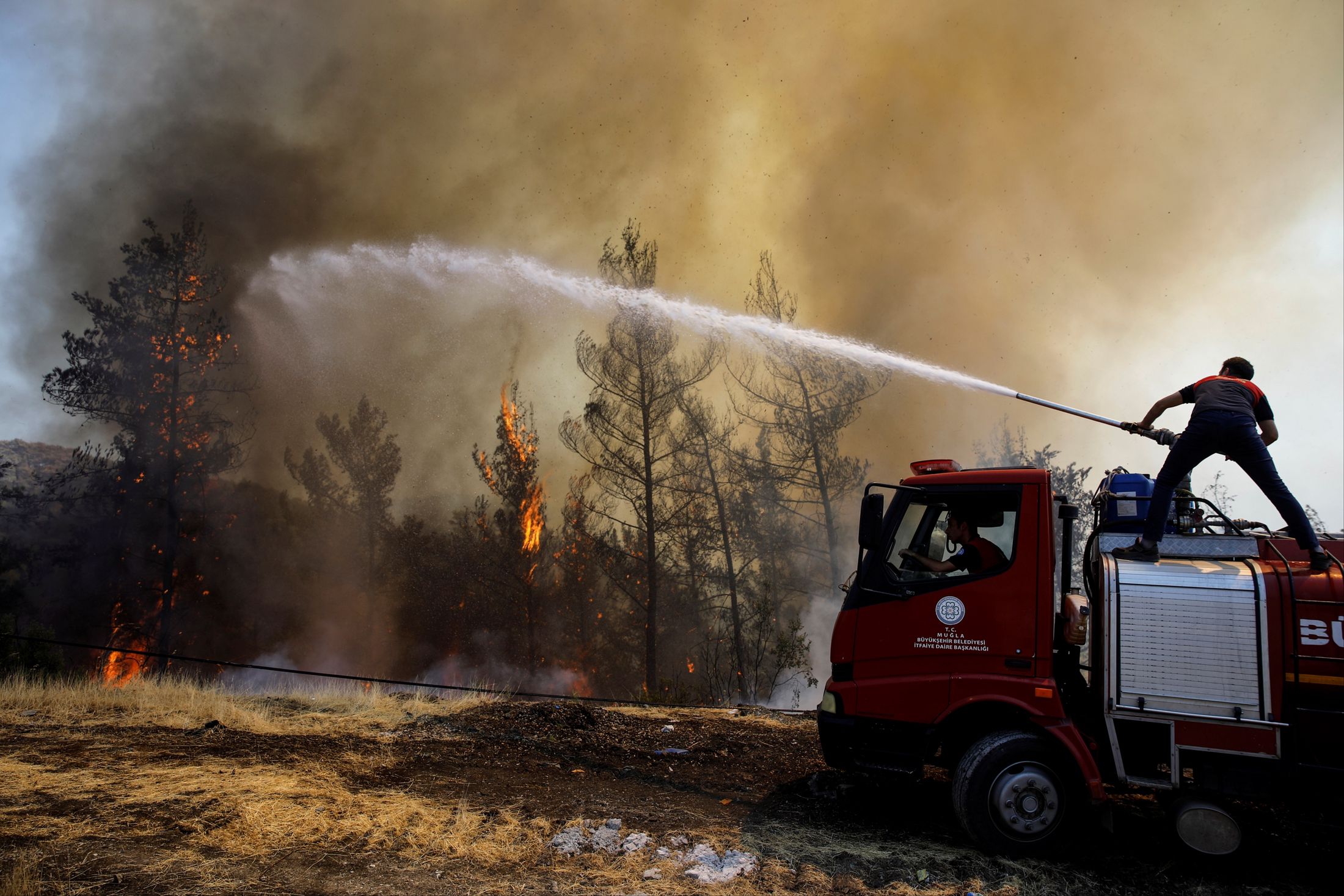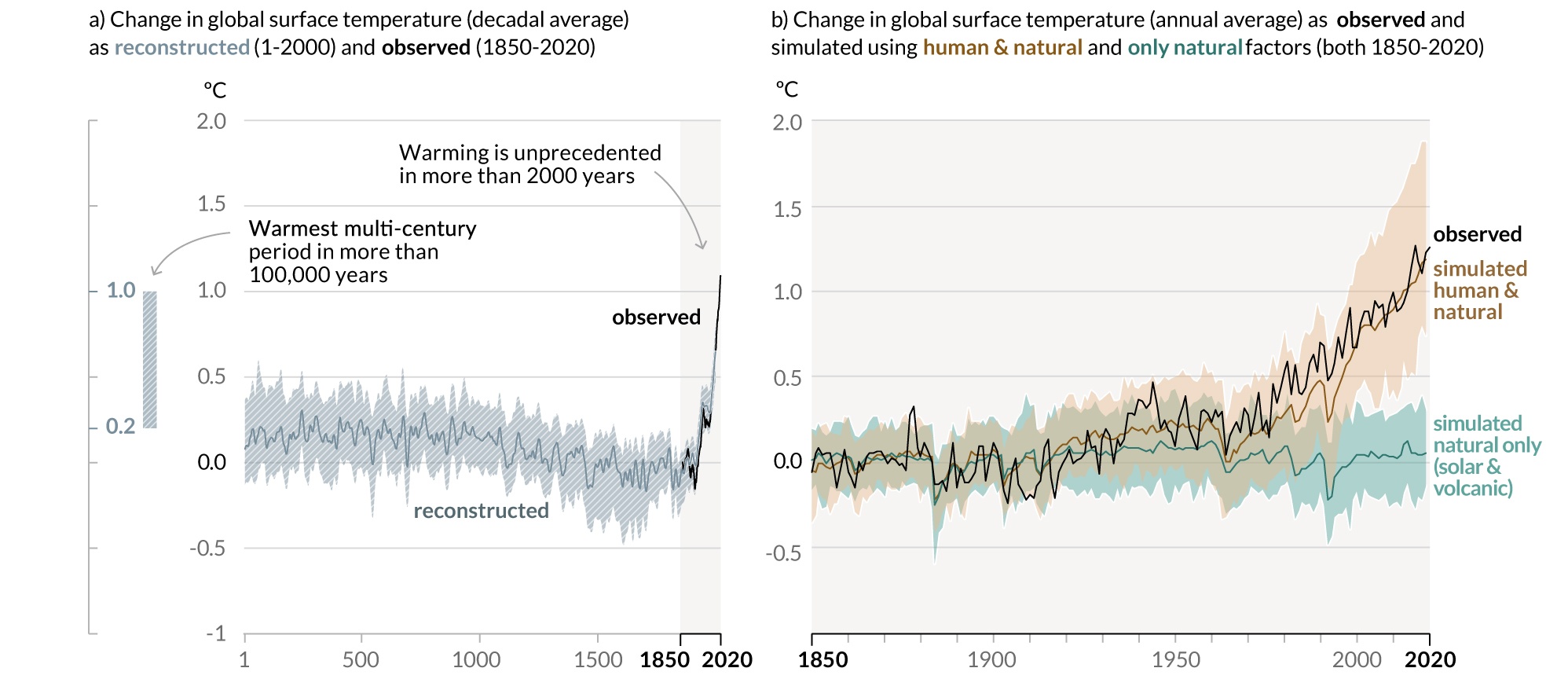IPCC climate report is a clarion call for urgent action, EU mobilises assistance to fight forest fires and the first-ever case of Marburg virus disease confirmed in Guinea. Here is what you missed from last week’s headlines in the international development sector:
WMO: New climate report is a clarion call for urgent action
A landmark new report by hundreds of the world’s top climate scientists is a clarion call for immediate action to slash greenhouse gases in the face of unprecedented and accelerating climate change, the World Meteorological Organization (WMO) said.
The Intergovernmental Panel on Climate Change (IPCC) Working Group I report, Climate Change 2021: the Physical Science Basis, provides the clearest and most comprehensive assessment to date of warming of the atmosphere, oceans, and land.
The scale of recent changes is unprecedented in thousands, if not hundreds of thousands of years. Many changes due to past and future greenhouse gas emissions are irreversible for centuries to millennia, especially changes in the ocean, ice sheets, and global sea level, says the report.
Forest fires: EU continues to mobilise assistance for Greece and other countries in region
The EU Civil Protection Mechanism continues to channel support to help combat unprecedented forest fires in Greece and the rest of the Mediterranean. Following requests from Greece, North Macedonia, Albania, Italy, and Turkey, the European Union has now helped mobilize 14 firefighting planes, 3 helicopters, some 1,300 rescuers, and 250 vehicles.
In Greece alone, 9 planes, close to 1,000 firefighters, and 200 vehicles are currently being deployed. The latest offers over the weekend came from France, Germany, Poland, Austria, and Slovakia, who are sending ground firefighting units. They will join forces already operating in the country: ground firefighting units from Cyprus, France, Czechia, and Romania as well as planes from Cyprus, Sweden, France, Croatia, and Spain.

West Africa’s first-ever case of Marburg virus disease confirmed in Guinea
Health authorities in Guinea confirmed a case of Marburg virus disease in the southern Gueckedou prefecture. This is the first time Marburg, a highly infectious disease that causes hemorrhagic fever, has been identified in the country, and in West Africa.
Marburg, which is in the same family as the virus that causes Ebola, was detected less than two months after Guinea declared an end to an Ebola outbreak that erupted earlier this year. Samples taken from a now-deceased patient and tested by a field laboratory in Gueckedou as well as Guinea’s national hemorrhagic fever laboratory turned out positive for the Marburg virus. Further analysis by the Institut Pasteur in Senegal confirmed the result.
DevelopmentAid Editorials
World’s biggest tire graveyard on fire. Cause, consequences and solutions | Expert’s Opinions
Last week was marked by news that shook the entire planet: the world’s biggest tire graveyard in Kuwait (where over seven million tires are stored) was on fire which could have transformed into a global environmental disaster if not extinguished quickly. The fire was so widespread that it was visible by satellite. In this context, more and more people are asking why the storing of such combustible materials is permitted in a country where temperatures reach 50C. We approached some environmental experts to share their opinion regarding this ecological disaster.
UN report: Humanity has to halt climate change before it is too late
Humanity has very little time left to take firm action to halt global warming which is the only way to prevent a worldwide catastrophe, the most extensive report on climate change has warned. The report, published by the UN Intergovernmental Panel on Climate Change (IPCC), highlights that with the global temperature already having increased by about 1.07 degrees C, the chances of the world being able to avoid the 1.5 degrees C scenario are practically zero. The report also noted that although the near future will certainly be hotter, it will depend on humankind how hot it will become

Top-10 safest countries to live in with lowest natural disaster risk
Millions of people around the globe are affected by natural disasters each year. Extreme natural events, such as floods, storms, or earthquakes, remote communities more vulnerable and increase the probability of forced displacement and migration. In addition to the natural disasters, the lack of coping and adaptive capabilities from authorities magnifies the risks associated with the affected communities becoming more susceptible to experiencing serious consequences in the aftermath of a disastrous event.
Top 23 worst hunger hotspots according to UN agencies
The number of people affected by acute food insecurity is on the rise and 23 countries will be particularly affected in 2021, the Food and Agriculture Organization (FAO) and the World Food Programme (WFP) have warned.
In their latest report, the FAO and the WFP point out that 41 million people currently face the threat of famine unless they are provided with food immediately. The figure will add to the 155 million people impacted by acute food insecurity in 2020.
Here’s what else has happened
Yemen: U.S. Agency for International Development (USAID) announced nearly $165 million in additional humanitarian assistance for people affected by the humanitarian crisis in Yemen. This funding will provide lifesaving aid for Yemenis continuing to face humanitarian crisis after almost seven years of war that has left 20 million people struggling to survive without basic necessities, including more than two million young children facing deadly malnutrition.
Philippines: Canada is committed to helping other countries combat the COVID-19 pandemic and to supporting their economic recovery and resilience. The Philippines continues to face high COVID-19 rates, and a range of restrictions remain in place, affecting livelihoods and access to education and health care, as well as increasing the strain on the advancement of peace and development on Mindanao.
Kerala, India: The Asian Infrastructure Investment Bank (AIIB) has approved USD125 million to help India’s state government of Kerala better prepare against natural disasters, the impact of climate change, and the outbreak of disease and pandemics.
Latin America and the Caribbean: Taking action to expand access to the COVID-19 vaccines, the Pan American Health Organization (PAHO) will use its Revolving Fund to help countries in Latin America and the Caribbean procure enough vaccines to control transmission, PAHO Director Carissa F. Etienne said.
Reports
International climate objectives will not be met if nuclear power is excluded, according to UNECE report
Nuclear power currently provides 20% of electricity generated in the UNECE region and 43% of low-carbon generation. Time is running out to rapidly transform the global energy system as fossil fuels still account for over half of electricity generation in the UNECE region. A new technology brief from the United Nations published notes that nuclear power can be seen as part of a broader portfolio alongside deploying other sustainable low- or zero-carbon technologies to decarbonize the global energy system and energy-intensive industries to deliver on the Paris Agreement and the 2030 Agenda for Sustainable Development.
Digital labour platforms offer young refugees a possible route to decent work
The digital economy can provide job opportunities for many young refugees but ensuring decent working conditions will require new directions in thinking and action, says a new ILO report.
The report, Towards decent work for young refugees and host communities in the digital platform economy in Africa: Kenya, Uganda, Egypt, finds that digital gig work has the potential to generate income for refugees. Since they often struggle to enter local labor markets, refugees may turn to prominent digital platforms such as Jumia or Upwork in the absence of local livelihood opportunities.
SADC release Synthesis Report on the state of food and nutrition security in the region
Southern Africa suffers from widespread food and nutrition insecurity. This year, in the ten SADC Member States that submitted data, an estimated 47.6 million people are food insecure, which is a 5.5% increase from last year and 34.3% above the 5-year average.
Events
World Water Week 2021
📅 23- 27 August 2021 | Virtual
Within a decade, people must rethink everything from how they grow food and generate energy to how they travel and use natural resources. This will require innovation on an epic scale and collaboration between people from all over the world with many different skills and backgrounds. Since all these transformations are closely linked to water, World Water Week has an important role to play as a meeting place for collaboration and learning.
The Role of Artificial Intelligence in Solving Current Development Challenges: Opportunities and Risks
📅 8 – 9 September 2021 | Rome, Italy | Virtual
The International Conference on Sustainable Development is organized by the European Center of Sustainable Development in collaboration with CIT University. The 9th ICSD 2021 is inspired by the critical challenge of human, environmental, and economic sustainability concerning the present and future generations in a global-scale context.

